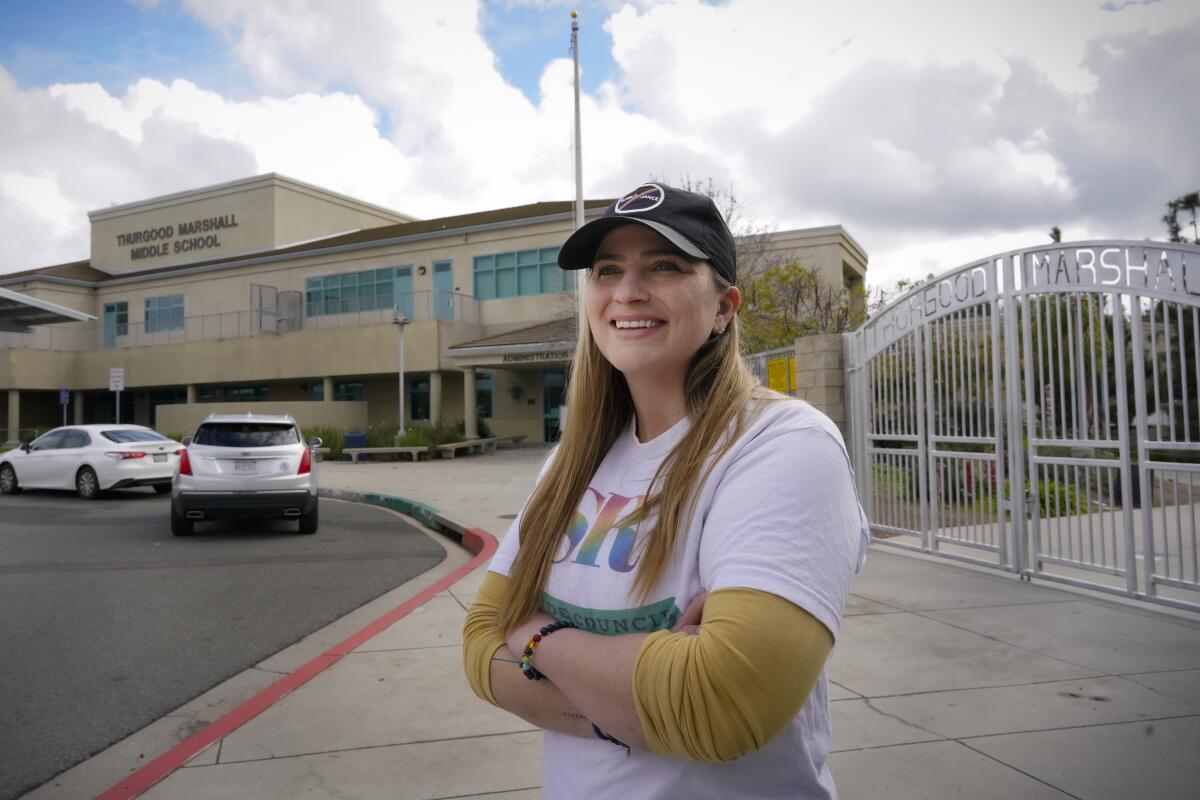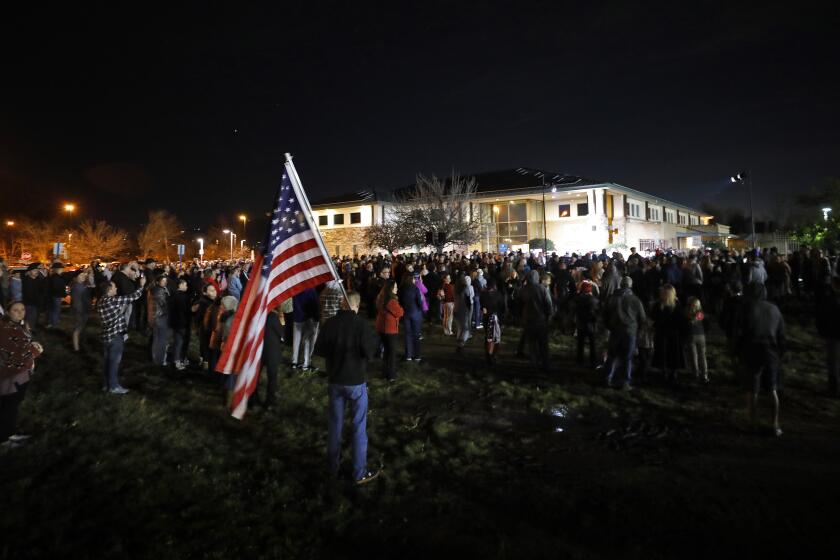A Scripps Ranch church hosted a controversial LGBTQ talk at a public school. Could the school say no?

San Diego Unified is reviewing its rental agreement with Canyon Springs Church after it invited a guest who spoke against being gay.
San Diego — On the first Sunday of this month, the pastor of a Scripps Ranch church brought in a guest speaker who talks about how she came to believe being gay is wrong.
The venue was San Diego Unified’s Marshall Middle School, where the church has held its services for the better part of two decades.
The speaker was Patti Height of Out of Egypt Ministries, who told her audience she used to consider herself gay but now believes that was a “false identity.” According to her website, her work aims to help Christians minister to LGBTQ people, believing that being gay is incompatible with being Christian.
This story is for subscribers
We offer subscribers exclusive access to our best journalism.
Thank you for your support.
Pastor Jack Hawkins, who founded Canyon Springs Church 25 years ago, said he had hoped it would start a conversation that would lead to healing and show his members how to better love their LGBTQ neighbors.
But now the event has ignited calls from some parents and activists for San Diego Unified to end its years-long rental arrangement with the church, leading to questions about what lines, if any, school districts or other public agencies are allowed to draw when it comes to providing space for religious and other community organizations.
Scripps Ranch residents and Marshall Middle parents are among more than 600 people who have signed a petition calling for San Diego Unified to terminate its rental agreement with Canyon Springs, contending that the church is violating the district’s anti-discrimination policy by endorsing anti-LGBTQ speech. A Marshall Middle parent filed a complaint with the district, also asking the district to end its contract with the church.
Even though the church holds its events outside of school hours and the church is separate from Marshall Middle, some parents and activists argued that students could still be affected by the knowledge that their school had provided a forum for somebody who condemns homosexuality.
“This is a school, a public school. This is taxpayer-funded, and this should be a safe, accepting, open environment 100% of the time,” said Brittany Fuller, the petition’s author, who founded the Scripps Ranch Pride Council last year.
Hawkins, meanwhile, said the petition misrepresents the messages of his church and Height, to the point of being defamatory. He said neither had taught anything hateful or discriminatory, and his church was not trying to make gay people straight.
Part of the reason he invited the speaker was to help parents whose children think they might be gay or transgender, he said.
“We’re not trying to change anybody or transition anybody. What our goal is is to love people where they’re at,” Hawkins said.
Hawkins added that Canyon Springs has been a good tenant of Marshall and that his church, which has about 300 regular members, had raised $100,000 to renovate the school’s theater where it holds its services, outfitting it with a new projection and sound system and carpet.
San Diego Unified is reviewing Canyon Springs Church’s rental permit to see whether the district’s facility rental policy was violated, district spokesperson Samer Naji said in an email. The policy says school facilities cannot be used by a group that illegally discriminates on the basis of sexual orientation, gender, gender identity or gender expression, among other characteristics.
Questions about gender, Scripture and who belongs in what spaces have been with the church for decades
Experts, however, say school districts cannot refuse to rent to a community group, such as a church, just because it doesn’t agree with the group’s beliefs or messaging.
According to Eugene Volokh, a constitutional law professor at UCLA School of Law, school districts are not allowed to deny renting their facilities to a church or any other organization based on the group’s opinions, because they constitute free speech.
“The answer’s open and shut. The school district cannot constitutionally discriminate based on viewpoint in its decisions about whom to rent things to,” he said.
The exception, Volokh said, would be if an organization used a facility for speech that doesn’t fall under free speech protection, such as making threats of violence.
School districts do not have to make their buildings available for community use, said Troy Flint, spokesperson for the California School Boards Assn., which advises districts on legal matters.
But if districts decide to do so, “it becomes challenging to regulate or restrict meetings based on the anticipated content,” Flint said in an email.
Districts cannot pick and choose which religious groups to rent to, Flint said.
“There are probably edge cases where a district could regulate based on anticipated content, but it’s a high bar that wouldn’t apply in most instances,” he said.
‘What needs to be saved?’
In her talk for Canyon Springs, Height told the congregation that her past LGBTQ experiences and identity were tied to years of abuse she had endured from men in her life, including her father and ex-husband.
After reading parts of the Bible and starting to attend church, she said, she came to believe that homosexuality was a sin and that she was not actually gay.
“I had a false sense of freedom, because I was carrying about in a false identity,” Height said. “It was an identity I created to keep myself safe.”
At Canyon Springs Church, Height said Christians are not called to “fix people,” because that’s God’s job. She said they should love their LGBTQ neighbors as themselves, and treat them the same as they would their straight neighbors.
“Their heart needs to change before their identity will — just like you, just like me,” Height said.
Solana Beach School District controversy raises the question: What should schools do when people object to library books?
But for Jen Quinn, a Marshall Middle School parent who said she was the only protester from the LGBTQ pride council to sit in on Height’s talk, some parts of the talk came across as more divisive than loving.
Quinn noted that toward the end of the lecture, Height picked up a Bible and told the audience, “Remember, it’s not you they hate. It’s this they hate.” Height also said, “We know that those who are Muslim or Buddhist need to convert.”
Quinn heard Height say that Christians should meet gay people where they are, but Height’s message came across to Quinn as: Christians need to help gay people turn back to God by trying not to be gay.
“My immediate response is, no, you’re the ones that need to change. You’re the ones that need to open your eyes and see that [being gay] is love and not an abomination,” Quinn said.
Fuller, who founded the pride council and who is gay, grew up Christian and attended Canyon Springs years ago. She stopped going to church because she said it made her feel like something was wrong with her.
Fuller found the presumption in Height’s talk that gay people can become straight to be harmful, and she wishes Canyon Springs had invited a current member of the LGBTQ community instead.
“What needs to be saved from our community?” Fuller said. “If no one needs to be saved and you’re just trying to love, why would you not invite someone that is an active member of the LGBTQ community ... so that you can actually understand what it’s like and how it feels to have someone dismiss your identity?”
Marshall’s principal, Josh Way, stressed to school families in a letter the day before Height’s talk that the church’s beliefs do not reflect the school’s.
“Our mission at Marshall Middle School is to ensure all of our students and staff feel safe, nurtured, and welcomed on our campus and in our classrooms. This includes our students and families within the LGBTQIA+ community,” Way added.
Way noted that the San Diego Unified School Board passed an LGBTQ resolution in June that commits to honoring student pronoun and name change requests, allowing student Genders and Sexualities Alliance clubs, having gender-affirming spaces at schools, training staff about gender identity and sexuality and more.
More to Read
Sign up for Essential California
The most important California stories and recommendations in your inbox every morning.
You may occasionally receive promotional content from the Los Angeles Times.













